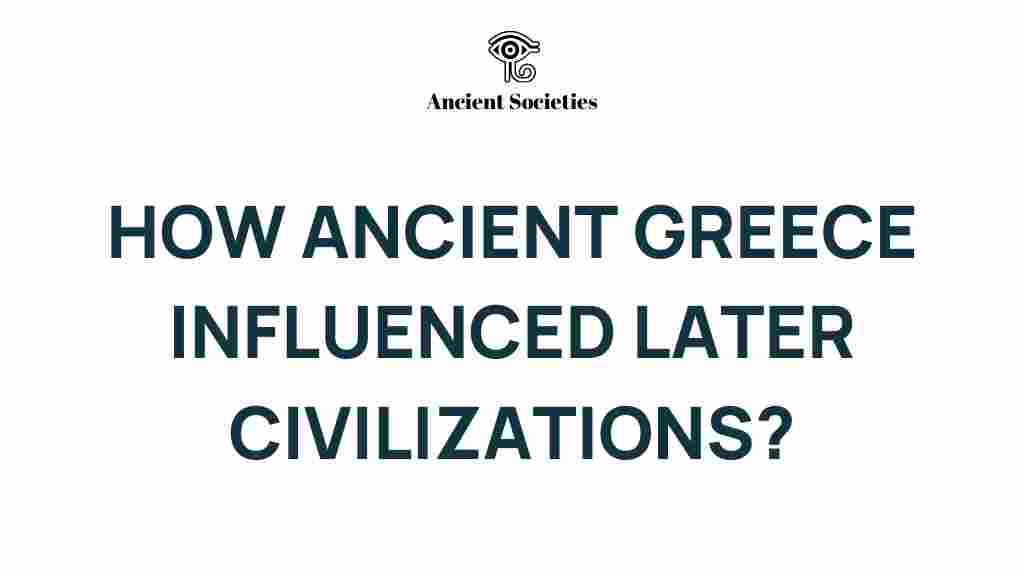Unveiling the Shadows: How Ancient Greece Shaped Future Civilizations
Ancient Greece is often hailed as the cradle of Western civilization, influencing a multitude of aspects in culture, philosophy, democracy, art, architecture, and history. The legacy of Ancient Greece persists in modern societies, shaping the frameworks of thought, governance, and artistic expression. This article explores the profound impact of Ancient Greece on future civilizations, highlighting its innovations and enduring contributions.
The Foundations of Western Civilization
The influence of Ancient Greece can be traced back to its foundational philosophies and political ideas. The ancient Greeks developed concepts that continue to resonate today:
- Philosophy: Thinkers like Socrates, Plato, and Aristotle laid the groundwork for Western philosophical thought.
- Democracy: The city-state of Athens introduced the idea of democracy, empowering citizens to participate in governance.
- Art and Architecture: The Greeks excelled in various forms of art, from sculpture to theater, and their architectural styles, such as Doric and Ionic, set a standard for future civilizations.
These elements not only defined Greek culture but also provided a template for subsequent societies to emulate and adapt.
The Philosophical Legacy
Philosophy was one of the most significant contributions of Ancient Greece. The pursuit of knowledge and understanding was paramount, leading to several key developments:
- Socratic Method: Socrates promoted critical thinking through dialogue, encouraging individuals to question their beliefs.
- Plato’s Academy: Plato established a school that became a model for future educational institutions, emphasizing the importance of philosophical inquiry.
- Aristotelian Logic: Aristotle’s contributions to logic and scientific methodology laid the groundwork for modern science.
These philosophical advancements not only influenced thinkers in Ancient Rome but also shaped the Renaissance and Enlightenment periods, affecting modern Western thought.
The Birth of Democracy
Ancient Greece’s contribution to democracy cannot be overstated. Athens is often credited with the development of democratic principles that have been adapted by many nations:
- Civic Participation: Citizens in Athens could vote on legislation and executive bills, a radical idea at the time.
- Rule of Law: The principles of justice and equality before the law were emphasized, influencing legal systems worldwide.
- Political Philosophy: Thinkers like Aristotle examined governance, contributing to the understanding of different political systems.
Today, the democratic ideals rooted in Ancient Greece continue to inspire movements for political freedom and civil rights around the globe.
Art and Architecture: A Lasting Influence
The artistic achievements of Ancient Greece have left an indelible mark on Western culture. Greek art and architecture established standards for beauty and proportion that are still revered:
- Classical Sculpture: Greek sculptures, such as those by Phidias, emphasized human form and emotion, influencing Renaissance artists.
- Theater: The Greeks developed drama and theater, creating genres and forms that are foundational to modern storytelling.
- Architectural Styles: Structures like the Parthenon exemplify the use of columns and symmetry, inspiring countless buildings worldwide.
The aesthetic principles derived from Ancient Greece continue to influence contemporary art and architecture, reflecting a timeless pursuit of beauty.
Innovation in Science and Mathematics
Ancient Greece was also a hub of scientific and mathematical innovation. Pioneers such as Euclid and Archimedes made groundbreaking contributions:
- Geometry: Euclid’s “Elements” laid the foundations for geometry, influencing mathematics for centuries.
- Physics: Archimedes made significant discoveries in physics and engineering, including the principle of buoyancy.
- Astronomy: Greek astronomers, such as Ptolemy, developed models of the solar system that were used for centuries.
These scientific advancements laid the groundwork for future discoveries and innovations, shaping the trajectory of human understanding.
Challenges and Misunderstandings
While Ancient Greece’s contributions are widely recognized, there are common misconceptions about its influence:
- Exclusivity: Some believe Ancient Greek culture was only for the elite, but many ideas permeated broader society.
- Static Influence: The notion that Greek influence is stagnant overlooks its dynamic adaptation in various cultures.
- Neglect of Diversity: The contributions of other ancient civilizations, such as Egypt and Mesopotamia, are often overshadowed by Greece.
Addressing these challenges is crucial for a comprehensive understanding of Ancient Greece’s role in shaping civilization.
Global Impact of Ancient Greek Civilization
The influence of Ancient Greece extends far beyond Europe. Its ideas and innovations have permeated various cultures:
- Renaissance Europe: The revival of classical learning during the Renaissance was heavily influenced by Greek thought.
- Islamic Golden Age: Greek texts were translated into Arabic, preserving and enhancing Greek knowledge during the Middle Ages.
- Modern Democracies: Many contemporary democratic systems draw directly from Athenian principles.
Ancient Greece serves as a reminder of the interconnectedness of human thought and cultural evolution.
Conclusion: The Enduring Legacy of Ancient Greece
In conclusion, Ancient Greece profoundly shaped future civilizations through its philosophy, democratic ideals, artistic achievements, and scientific innovations. The cultural and intellectual legacies of Ancient Greece continue to influence contemporary society, underscoring the importance of understanding this ancient civilization.
As we explore the depths of history, we recognize that the shadows of Ancient Greece are not merely remnants of the past but vibrant threads woven into the fabric of modern civilization. For further insights into how history shapes our present, visit this resource on historical influences.
By acknowledging the contributions of Ancient Greece, we enrich our appreciation for the diverse tapestry of human achievement and innovation. Their legacy is a testament to the enduring power of ideas and the shared journey of humanity.
This article is in the category History and created by AncientSocieties Team
